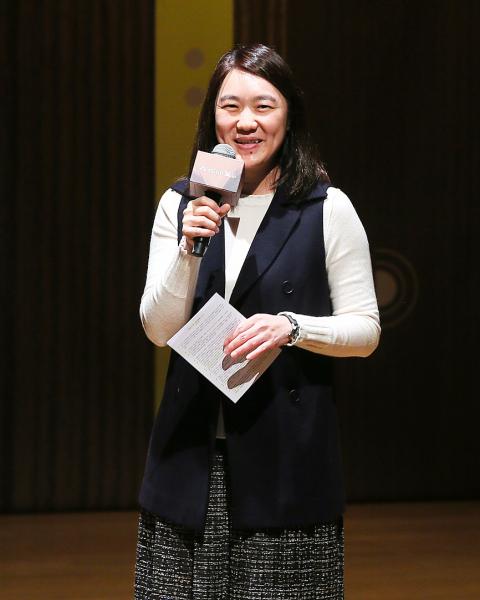Eslite Spectrum Corp (誠品生活), which runs the Eslite bookstore chain (誠品書局) and other businesses at home and abroad, is mulling opening new outlets in Southeast Asia, although bookstore operations remain unprofitable, chairwoman Mercy Wu (吳旻潔) said yesterday.
The Taipei-based conglomerate is studying the possibility of making inroads in Southeast Asia in line with plans to strengthen its cultural innovation business, including 50 bookstores in Taiwan, Hong Kong, China and Japan, Wu said.
“Today, profitability continues to pose the biggest challenge for Eslite as it turns 30 years old this year,” Wu told a news conference in Taipei, while announcing the bookstore chain’s annual report on reading behaviors and market trends.

Photo: CNA
Wu, who took over the company’s reins in 2017 after the sudden death of her father, Robert Wu (吳清友), said that the bookstores had to increase capital by NT$2 billion (US$65.56 million) over the years to stay in business.
The company has identified 100 sources of losses, but has yet to find a profitable business model, she said, adding that no enterprise in the world can live off running bookstores as its core operation.
Eslite Spectrum also runs department stores and restaurants, and sells appliances and equipment for hotels, restaurants, kitchens and wine cellars.
Malaysia appears the most likely venue, as 25 percent of its population is ethnic Chinese, making expansion easier, Mercy Wu said.
Hopefully, the bookstore chain can cast off its “unprofitable” shackles to prolong its existence, Mercy Wu said, adding that she is to keep the passion for cultural business alive.
Eslite Spectrum reported that consolidated revenue increased 18.14 percent year-on-year to NT$4.31 billion in the first 10 months of this year.
In the first three quarters, net income fell 29.31 percent to NT$184.01 million, or earnings per share of NT$3.88, company data showed.

US PROBE: The Information reported that the US Department of Commerce is investigating whether the firm made advanced chips for China’s Huawei Taiwan Semiconductor Manufacturing Co (TSMC, 台積電), the world’s largest contract maker of advanced chips, yesterday said it is a law-abiding company, and is committed to complying with all applicable laws and regulations including export controls. The Hsinchu-based chip giant issued the statement after US news Web site The Information ran a story saying that the US Department of Commerce has launched a probe into TSMC over whether it breached export rules by making smartphone or artificial intelligence (AI) chips for China’s Huawei Technologies Co (華為). “We maintain a robust and comprehensive export system for monitoring and ensuring compliance,” the statement said. “If we

DEMAND FOR AI CHIPS: Net income in the third quarter surged 31.2% quarter-on-quarter to NT$325.26 billion, the strongest quarterly return in the company’s history Taiwan Semiconductor Manufacturing Co (TSMC, 台積電), the world’s biggest contract chipmaker, yesterday raised its revenue forecast to annual growth of 30 percent this year, thanks to strong and sustainable demand for artificial intelligence (AI) processors for servers. It was the second upward adjustment from 25 percent year-on-year growth estimated three months ago, despite recent concerns about whether the AI boom could be another technology bubble. “The demand is real. It’s real. And I believe it is just the beginning of this demand. Alright, so one of my key customers said the demand right now is ‘insane,’” TSMC chairman and chief executive C.C.

Starbucks Corp might have the more recognizable name, but 7-Eleven’s City Cafe remains the king of Taiwan’s fresh coffee market, helped by the convenience store chain’s extensive market presence and product diversification. President Chain Store Corp (PCSC, 統一超商), which runs both the 7-Eleven and Starbucks store chains in Taiwan, established the City Cafe brand in 2004. The brand took off when actress Gwei Lun-mei (桂綸鎂) became its spokesperson in 2007. City Cafe’s sales exceeded NT$10 billion (US$311.69 million) for the first time in 2015, surpassing the revenue of Starbucks Taiwan, and rose to more than NT$17 billion last year, exceeding the NT$14.98

COUNTRY-BASED: Setting ceilings on sales of the technology would tighten limits that originally targeted China’s ambitions in artificial intelligence amid security risks US officials have discussed capping sales of advanced artificial intelligence (AI) chips from Nvidia Corp and other American companies on a country-specific basis, people familiar with the matter said, a move that would limit some nations’ AI capabilities. The new approach would set a ceiling on export licenses for some countries in the interest of national security, according to the people, who described the private discussions on condition of anonymity. Officials in the administration of US President Joe Biden focused on Persian Gulf countries that have a growing appetite for AI data centers and the deep pockets to fund them, the people